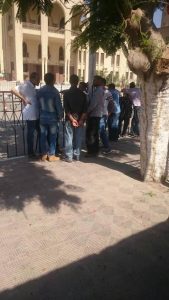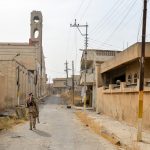By Watani –
In despair that they would be able to build a church they direly need in their village, a number of Copts from the village of Koum al-Loufi in Samalout, Minya, some 250km south of Cairo, held a stand publicising their demand on Sunday 4 June in front of the St Mark’s Cathedral in Abbassiya. The conservative Muslim villagers have been refusing to allow the Copts to worship in the village, let alone build a church. Local politicians and security officials have failed to persuade the Muslims to allow the Copts to exercise their constitutional right of freedom of worship and build a church in Koum al-Loufi. Obviously, fearing social unrest and unbridled violence should they force the village Muslims to accept a church in their midst, the local authorities opted for social peace and let matters lie at that. The Copts never got their church or the right to hold prayers anywhere in the village.
Oppressive initiative
Under pressure from Minya politicians and security officials, Koum al-Loufi Muslims last April came up with an initiative offering Copts to build their much-needed church outside the village, a one-storey building with no religious symbol such as cross or bell tower. The Copts rejected the initiative as unjust and oppressive. They issued a statement detailing their predicament:
“We, the Copts of Koum al-Loufi in Samalout, Minya, have been suffering since June 2016 of a tragedy represented in banning us from worship, and in attacking us and violating our rights as Egyptian citizens at the hands of extremist Muslims.
“It started in June 2016 when a rumour circulated in the village that a Coptic-owned house would be converted into a church, upon which a number of our homes were set ablaze. Even though the perpetrators of the violence were all well-known to the villagers, none of them was caught. Those caught for burning the Copt’s houses were all set free in August 2016 [but the charges against them still stand].
“Even then, we were not allowed to live in peace, but were constantly threatened and attacked by throwing stones at us in the streets. A number of Coptic families had to leave the village, but were encouraged to go back home by local politicians and security officials, and promised they would be allowed to live in peace. Samalout bishopric repaired the damaged houses at its own expense, and the security officials promised to re-open a building that had been used for prayers years ago but was closed in 2011.”

Paying the price
“However, the extremists insisted this was not to be,” the statement said. [Hoping to resolve the matter peacefully] the security authority repeatedly attempted to persuade them to agree to the Copts holding prayers in the village, but to no avail. As the negotiations lingered on, Egypt and its Copts were victims of a number of terrorist attacks, so we kept our peace in respect for the painful incidents that took place. But we paid the price dearly, since we were not allowed to worship in our village; and were even denied that right to worship in churches in nearby villages by extremist Muslims in these villages.
“On Holy Thursday, 13 April 2017, we were granted a security permit to hold prayers in a house owned by a Coptic villager. We did that under police protection, but were attacked with stones as headed back home once prayers were over. Three of our houses on the outskirts of the village were burnt, our fields were attacked and crops uprooted, and we could not leave our homes for five full days owing to the threats against us. We could not hold Good Friday prayers or Resurrection Mass.
“Despite the fact that the police now has the village under control and a number of the extremists have been caught, their stance against the Copts worshipping in the village stands firm. They are attempting to impose their own conditions through an initiative they launched in which they suggested three Coptic-owned plots of land located outside the village for the Copts to choose one on which to build a one-story building in which to worship. This building, the initiative declares, should carry no religious symbol whatsoever: none of the traditional cross, bell tower, or dome.
Rejecting blackmail
“We here declare that we refuse to submit to the blackmail of extremists who wish to impose their sway over Egyptian citizens living under a State of law and order. We expect that State to lift the oppression under which we have been living in agony for some 10 months. We expect to be granted the basic right of worshipping in a safe, secure place. We expect the perpetrators of the violence to be taken to account, and justice to be served.
“The Egyptian Constitution in its Article 64 explicitly secures the absolute freedom of belief and the freedom to practise religious rights and build places of worship for those who belong to the heavenly religions.
“We thus declare we do not submit to conditions imposed by those who wish to take the law in their hands and usurp the privileges of the State.
“We ask President Abdel-Fattah al-Sisi to intervene to put an end to the suffering of Koum al-Loufi Copts, and to ensure the enforcement of the law. The 19 men charged with burning our houses in June 2016 are at large; no date has been set for their trial. We have been under intolerable pressure to ‘conciliate’ with them and relinquish our legal rights, but we are adamant that the law should be enforced since we live under a State of law.”
Worth noting is that Koum al-Loufi Muslims had declared in their initiative that Minya Governor Essam al-Bedeiwi supported it. However, both Minya Governor and Samalout Bishopric and announced that they knew nothing about the initiative.
For the full story of Koum al-Loufi Copts: http://en.wataninet.com/coptic-affairs-coptic-affairs/sectarian/minya-copts-protest-continued-closure-of-church/19279/
___________________





